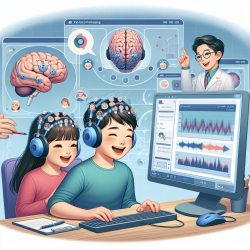Introduction
In the realm of speech-language pathology, understanding the neural mechanisms underlying speech intelligibility, especially in challenging environments, is crucial. The research article "Cortical Alpha Oscillations Predict Speech Intelligibility" offers valuable insights into how brain oscillations, particularly alpha rhythms, play a pivotal role in processing speech in noise (SiN) tasks. This blog aims to elucidate these findings and explore how they can be applied to improve outcomes in children receiving online therapy services.
Understanding the Research
The study conducted by Dimitrijevic et al. (2017) focuses on cortical alpha oscillations (8–12 Hz) and their impact on speech intelligibility during a digits-in-noise (DiN) task. The research highlights three key findings:
- Alpha event-related synchronization (ERS) was observed during active listening, indicating increased cognitive effort and attention.
- Alpha event-related desynchronization (ERD) was more pronounced during correct digit identification, suggesting enhanced sensory processing.
- No significant oscillatory changes were noted during passive listening, underscoring the importance of active engagement in auditory tasks.
Implications for Practitioners
For practitioners providing online therapy services, these findings offer several actionable insights:
- Active Engagement: Encourage active participation in auditory tasks to enhance alpha oscillation activity, thereby improving speech intelligibility.
- Tailored Interventions: Utilize EEG data to tailor interventions based on individual alpha oscillation patterns, optimizing therapy outcomes.
- Focus on Attention: Develop strategies that enhance attention and reduce cognitive load, leveraging the relationship between alpha ERD and correct speech identification.
Encouraging Further Research
While the study provides a robust foundation, further research is essential to explore the applicability of these findings in diverse populations, including children with speech and language disorders. Practitioners are encouraged to engage in research collaborations to expand the understanding of cortical oscillations and their impact on speech processing.
Conclusion
By integrating the insights from "Cortical Alpha Oscillations Predict Speech Intelligibility," practitioners can enhance their therapeutic approaches, leading to improved speech outcomes for children. The study's emphasis on active listening and attention underscores the importance of engaging children in meaningful auditory tasks. To read the original research paper, please follow this link: Cortical Alpha Oscillations Predict Speech Intelligibility.










